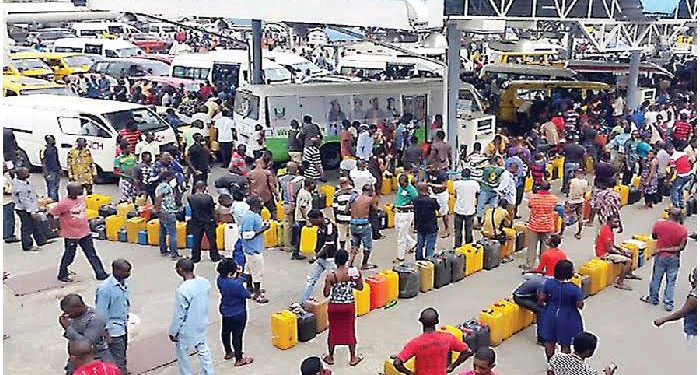Fuel queues have reemerged across Lagos in response to a recent rise in petrol prices implemented by the Nigerian National Petroleum Company Ltd (NNPC) and various marketers.
According to the News Agency of Nigeria (NAN), numerous filling stations, particularly along Ikorodu Road, Ikeja, and Bariga, have temporarily shut down due to the price increase.
NAN’s reporter observed that the pump price at NNPCL stations has surged to N998 per liter, with other marketers setting even higher rates. For instance, filling stations in the Northwest are now charging N1,000, Hyden Petroleum has set its price at N1,100, and NIPCO is charging N1,050.
This price hike marks the third increase in just two months, coinciding with the commencement of petrol purchases from the Dangote Oil Refinery located on the outskirts of Lagos.
NNPC Ltd. has escalated petrol prices from N855 per liter to N998 in Lagos, with prices hitting N1,003 in North-Eastern states. On September 3, prices had already risen from the lowest point of N568 in Lagos and N617 in other regions, reaching a minimum of N855.
Dr. Ayodele Oni, an energy lawyer, proposed that the government could enhance competition by facilitating the establishment of modular refineries and upgrading existing national facilities. He emphasized that increased competition among refiners could lead to more favorable pricing for consumers.
To address fluctuations in exchange rates, Oni recommended that the government partially support the Naira with foreign currency in the short term. For a more sustainable solution, he advocated for policies that promote exports and attract foreign direct investment to enhance dollar inflows.
Oni also suggested diversifying the economy into manufacturing and agriculture to mitigate import costs. He encouraged the exploration of alternative fuel sources, such as Compressed Natural Gas (CNG), and urged citizens to take advantage of government incentives for converting vehicles to CNG.
Furthermore, he called on the government to develop mass transit systems to lessen the impact of fuel price volatility on the population.
According to Oni, Nigeria is currently functioning under a deregulated environment where prices are determined by market dynamics, including exchange rates. He attributed the recent price increases primarily to the escalating dollar exchange rate against the Naira, given that the petroleum sector operates in a dollar-dominated market.
Oni expressed optimism that the crude-for-Naira agreement between NNPC and the Dangote Refinery would contribute to stabilizing the Naira against the dollar, thereby alleviating pricing pressures. (NAN)











